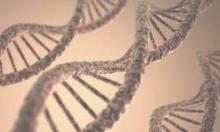A genetic assay designed to predict breast cancer metastasis and response to adjuvant chemotherapy has undergone rapid uptake, and clinicians are generally following guidelines for its use, researchers reported online in JAMA Oncology.
Overall use of the Oncotype DX 21-gene recurrence score (RS) assay rose from 1.1% in 2005 to 10.1% in 2009 (P < .001), reported Dr. Michaela Dinan of Duke University, Durham, N.C., and her associates.
“We found that use of the assay was largely restricted to the populations for which it was initially approved in 2005, namely women with estrogen receptor-positive, lymph node-negative, stage I or II breast cancer,” the investigators said (JAMA Oncol. 2015 Mar. 5 [doi:10.1001/jamaoncol.2015.43]).The RS assay has been available commercially since 2004, and the Centers for Medicare & Medicaid Services has covered it since 2006. Dr. Dinan and her associates studied records from a Surveillance, Epidemiology and End Results (SEER) data set with linked Medicare claims to understand trends in testing. The study included 70,802 patients with breast cancer, all of whom were at least 66 years old at diagnosis.
Almost 61% of patients who were tested with the RS assay met the National Comprehensive Cancer Network’s criteria for intermediate-risk disease – estrogen receptor–positive, lymph node–negative tumors measuring more than 1 cm, said the researchers. Most other tested patients had “borderline” indications for use of the assay, such as T1b or N1 disease. Significant predictors of testing included being less than 70 years old at diagnosis, having less than two comorbid conditions, and having tumors that were grade 2 or 3 or larger than 2 cm. Testing varied little geographically, and not at all by race, the investigators noted.
The RS assay is currently not required or universally recommended for all breast cancer patients who are considering adjuvant chemotherapy, so the researchers could not assess whether patients were being adequately tested, they said. They recommended analyzing other data besides that from the SEER-Medicare data set, including data on younger women, who might have distinct patterns of testing and chemotherapy use. Because some studies also indicated that the RS assay might be useful in patients with node-positive disease, the investigators also suggested examining its use in this setting and assessing how testing affects costs, chemotherapy use, and treatment outcomes.
The Agency for Healthcare Research and Quality funded the study. The authors reporting having no relevant conflicts of interest.


